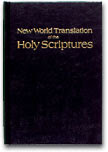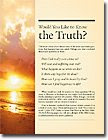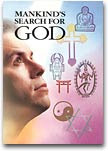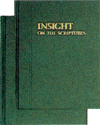The way that the above verse is supposed to be translated has been argued for many decades with no one coming off the clear victor. Many say that Jesus was alluding to God's words at Exodus 3:14-15 where Jehovah calls Himself, "I AM." However, the evidence suggests that translating the last two words of the sentence, "I am" at John 8:58 word-for-word from the Greek "ego eimi" literally is not proper. Many will ask why that is the case.
The reason is that when translating from one language to another, if a phrase is translated word-for-word, it will not always make sense. For example, if I said, "el casa de blanco" in Spanish and translated it word-for-word, "the house of white", it would make very little sense. If I translated it properly, though, "the white house" it would make sense. Likewise, although Jesus said, "ego eimi", it should not be translated so literally because it makes no sense. Jesus was not trying to equate himself with God, he was only talking about being alive before Abraham. How can we draw this conclusion? First of all, from the context.
"Jesus replied, "If I glorify myself, my glory means nothing. My Father, whom you claim as your God, is the one who glorifies me. Though you do not know him, I know him. If I said I did not, I would be a liar like you, but I do know him and keep his word. Your father Abraham rejoiced at the thought of seeing my day; he saw it and was glad."
"You are not yet fifty years old," the Jews said to him, "and you have seen Abraham!"
"I tell you the truth," Jesus answered, "before Abraham was born, I am!" At this, they picked up stones to stone him, but Jesus hid himself, slipping away from the temple grounds."-John 8:54-59
Now why, someone may ask, would the Jews get so worked up over Jesus' claim of being older then Abraham?
The answer is found in the Jewish view of Abraham. Abraham was so important to them that he was the equivalent of Christ for us. Abraham was so important to the Jews because they claimed that being children of Abraham was a special title reserved for them. For Jesus to claim that he was older then Abraham was sacrilegious to the Jews. When someone is older, they have more power and authority. In short, they are better then a younger person. To any Jew, Abraham would have been better then Jesus mainly because Abraham was older. For Jesus to say that he was alive before Abraham was alive would mean that Jesus was better then Abraham.
Proof of this thought process, older being synonymous with greater, is found in another account in the Bible.
"John answered them, saying: 'I baptize in water. In the midst of you one is standing whom you do not know, the one coming behind me, but the lace of whose sandal I am not worthy to untie.' These things took place in Bethany across the Jordan, where John was baptizing.
"The next day he beheld Jesus coming toward him, and he said: 'See, the Lamb of God that takes away the sin of the world! This is the one about whom I said, Behind me there comes a man who has advanced in front of me, because he existed before me. Even I did not know him, but the reason why I came baptizing in water was that he might be made manifest to Israel.'"-John 1:26-31
John would have been considered greater then Jesus because John was born about six months before Jesus. But since Jesus was alive in heaven before his birth then Jesus was better then John, or "advanced in front of [him]." Since the Jews did not accept the pre-human existence of Jesus Christ, these words would be weird to them but they wouldn't throw them into a blind fury like it did with Christ's statement about Abraham.
Many scholars also agree with this, that Jesus was simply saying that he existed before Abraham. Look at some of the ways different Bible's translate John 8:58.
"I was in existence before Abraham was ever born." (The Living Bible)
"Before Abraham was, I existed." (New Living Translation, 1995 Edition)
"Before Abraham was, I already was." (Bible in Worldwide English)
"Before Abraham was, I have been." (New American Standard Bible, Footnote, 1960 and 1973 Edition)
"From before Abraham was, I have been." (The New Testament, by G. R. Noyes.)
"I existed before Abraham was born!" (The Bible—An American Translation, by J. M. P. Smith and E. J. Goodspeed.)
"Before Abraham was born, I was already the one that I am." (Das Neue Testament, by Jörg Zink.)
"I was alive before Abraham was born!" (The Simple English Bible)
A well-known Greek New Testament Scholar and Professor [1] said that in John 8:58, the words "I AM" are not the proper translation for the Bible text. In fact, his preference of the verse is how the Living Bible renders it. "I was in existence before Abraham was ever born." This professor-scholar, Dr. Jason BeDuhn, says that this carries the real meaning in translation. He prefers it over the rendering in the New World Translation for only one reason.
He says that in a sentence like this one in Greek, the words "I am" should actually be moved to the front of the sentence. He also says that the way the sentence is written makes it necessary for the words "ego eimi" to be translated "I have been" or "I was" and then moved to the front of the sentence, thus making the sentence read "I have been before Abraham was born" or "I was before Abraham was born."
Furthermore, Jesus was not quoting Exodus 3:14 at all. The original word for "I AM" in the Old Testament was "hayah". Literally, "I am". That was a title that God applied to Himself. That is probably why His name is Yahweh, it is a derivative of "hayah" which, while literally translated "I AM" actually carries the meaning "to exist or to be or become." God, in Exodus 3:14-15, is telling Moses to tell the Israelites either that He does indeed exists or that He will indeed become the One who releases them from bondage in Egypt. He is, therefore, telling them to have faith.
Now, there has been a realization that this word, "hayah" should not actually be translated "I am". The idea of what it should be translated is still being argued. However, some popular translations say something like, "I shall prove to be what I shall prove to be" or something similar. Further, while many claim that this is a name or title that God is applying to himself, that is not the case.
Sure, right after Moses asked for a name to give the Israelites God responded with, "tell them I Am who I Am" has sent you. But in the next verse He says, "Jehovah...has sent me to you. This is my name to time indefinite, and this is the memorial of me to generation after generation." God said that His name was Jehovah, not "I AM." "I AM" was not even used as a title, but a description.
Again, when a little more research is done with this verse, we can see that this can be used to prove Jesus' pre-human existence and not that he was God.
References
[1]"Truth in Translation: Accuracy and Bias in English Translations of the New Testament" by Dr. Jason BeDuhn



























